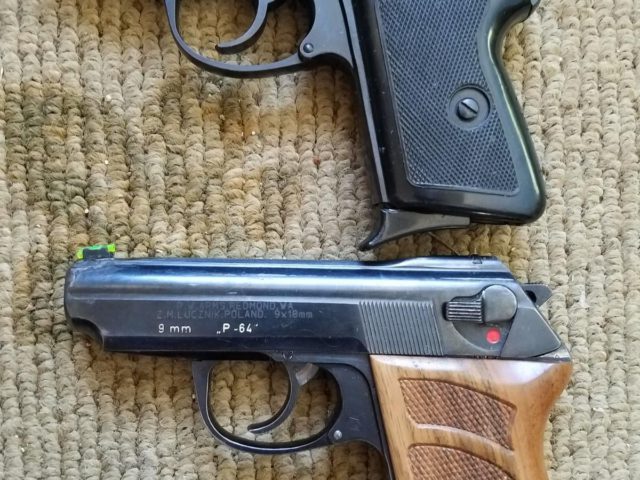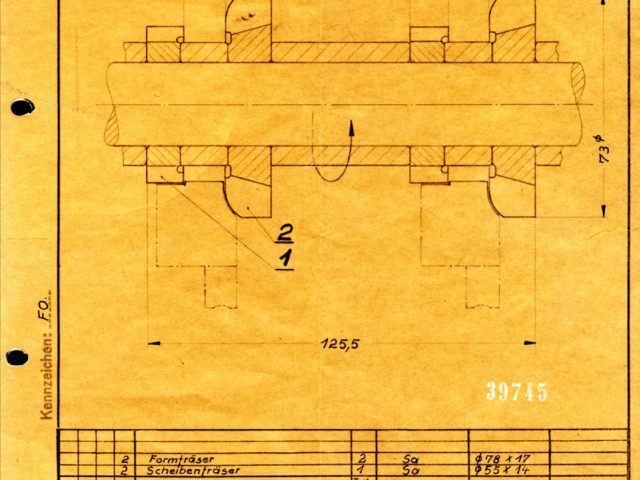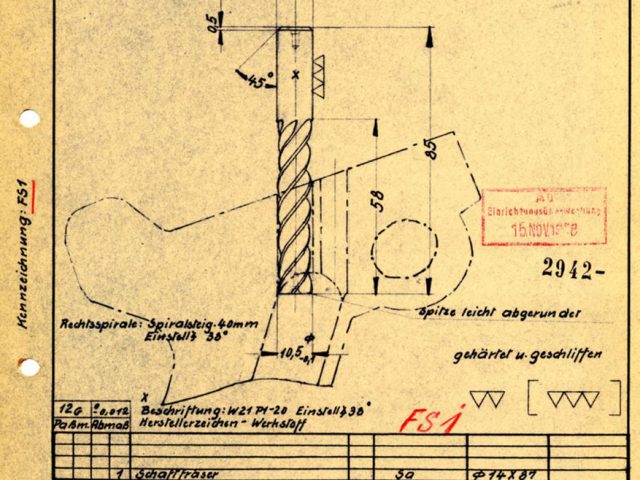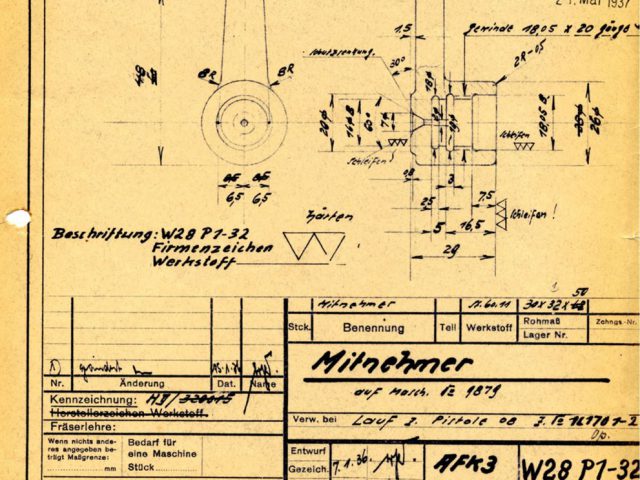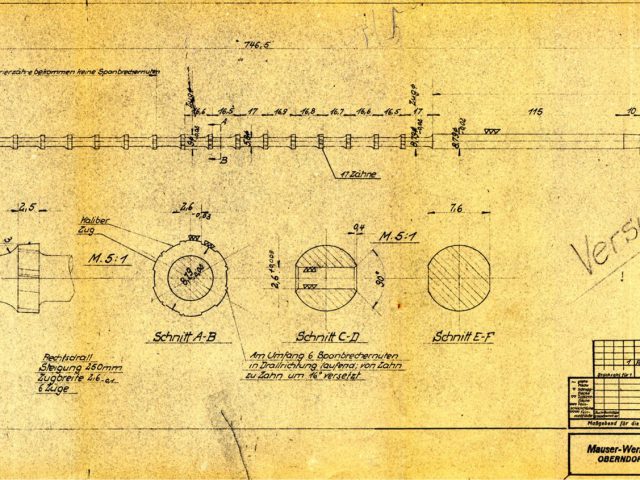Forum Replies Created
-
AuthorPosts
-
 LittleManKeymaster
LittleManKeymasterYou have not specified if your carbine is one of the ones converted AFTER the US Civil War, or if it is one of those not converted and released as surplus in it’s original configuration. Originally the gun used a paper or linen cartridge that used a percussion cap to firie a .54 caliber bullet. Battle experiences during the war convinced the US Army that percussion cap systems were obsolete and cartridges were a better tool. The US Army then developed a new cartridge called the .50-70 for use in their rifles and carbines. A few thousand of a hand selected group of Sharps Carbines were selected and converted to use this cartridge. The conversion required reducing the bore diameter down and replacing several parts of the action. Some of the guns got new barrels, some of them had their barrels re-lined with a reduced diameter sleeve. Both configurations require Black Powder use as neither used high carbon steel in construction. Guns not converted were released to civilians as surplus. Converted weapons were issued to US soldiers. (It is worth noting the US Army also converted many percussion rifles to a trapdoor pattern that also fired the .50-70 cartridge.) The ‘Civilized Tribes’ of the Oklahoma Indian Territory had broken their Treaty with the US and sided with the Confederacy during the Civil War, but their commanding general and former President and Principle Chief, Stand Waite, refused the terms of the Confederate Surrender at Appomattox General Waite and his soldiers continued hostilities against US soldiers and civilians. His War Crimes provided justification for the 30 year period known as the Indian Wars and led to the Western expansion of the US across the former Indian Territories. Many Sharps carbines and Trapdoor rifles were used in this period. Early in the Indian Wars a decision was approved to force the Indians into submission by eliminating their primary food source, the American Bison. At the same time the East Coast of the US was in great demand of a meat source for their crowded cities. The US Army began offering a cash bonus for every set of buffalo (bison) ears while at the same time traders of the East were offering cash for buffalo fur and meat. To aid in the extermination of the Indian ‘menace.’ the US Army began issuing FREE rifles and ammunition to any person who showed up at a Western Army fort and wanted to hunt buffalo for a living. Tens of thousands of former Civil War veterans from both sides as well as new immigrants to the US rushed to take advantage of the offer and become ‘Buffalo Hunters.” Both types of Sharps carbines saw use. At the same time Indians who agreed to live on their assigned reservation were also sold these rifles at their trading post so they could hunt. A famous photograph of Geronimo which shows him holding his Sharps carbine is at this link.. http://totallyhistory.com/wp-content/uploads/2013/04/Geronimo-with-rifle.jpg Within a decade the great buffalo herds of the era were extinct although the Wars against American Indians continued until the end of the 19th century. Usually .529 diameter bullets work well in percussion Sharps carbines. This website both sells such bullet molds and also has videos showing how to make the paper (or treated linen) cartridges one needs. https://www.erasgonebullets.com/store/product/-54-richmond-sharps If however your Sharps carbine is one of the converted ones, you can’t use those bullets and need complete .50-70 Black Powder cartridges. Live .50-70 rounds can be obtained at/from https://www.buffaloarms.com/50-70-sharps-black-powder-ammo-amobp5070425.html Hope this helps.
 LittleManKeymaster
LittleManKeymasterThe original caliber for the 1873 Sharps carbine was .54. If I owned one of those percussion breech loaders I would probably be giving these a try.
https://www.midsouthshooterssupply.com/item/00002ac1597at/54-caliber-348-grain-aero-tip-copper-mag-power-belt-(15-per-pack) LittleManKeymaster
LittleManKeymasterSounds good. My only thought is the flight path of the .35 Remington pretty much requires shots of under 130 yards or so. Will the mulie let him get that close?
 LittleManKeymaster
LittleManKeymasterThe gun requires black powder centerfire cartridges.
Brass is hard to get, but reloading dies do exist.
The normal load is 70grains of FF powder under a 425 gr. soft lead bullet of .512 diameter.The best (only really) place I know to obtain pre-loaded .50-70 US cartridges is the website below.
 LittleManKeymaster
LittleManKeymasterPlease see the article posted in the gunsmith forum about converting your P64 to work with an 8(!) round magazine. The simple steps shown there will go a long way from transforming your P64 from a Cold War relic to something not terribly impractical in today’s world.
 LittleManKeymaster
LittleManKeymasterIf, besides the horrid factory DA trigger pull there is a failing of the P64 it would be in terrible factory sights. A solution exists. Grind or machine off the factory front sight and replace it with a small fiber optic (aka light pipe). Light pipes are available in many colors, blue, green, red, white, etc. The difference is dramatic.
Here you can see a P64 as it left the factory above and alongside a P64 that has been personalized with a better (Wolff) mainspring, wooden grips and a fiber optic front sight.
You can see from the personalized P64 being aimed at a door the improvement in quick acquisition of the target is dramatic.
Attachments:
 LittleManKeymaster
LittleManKeymasterHaving already adjusted the zero of the Bushnell TRS25 sight I try the UTG 3x magnifier.
 LittleManKeymaster
LittleManKeymasterHere is 5D Tactical’s own video on using their Jig to machine out an AR 15 billet with a router.
http://www.youtube.com/watch?v=DnirrLZRE7s
Here isHere is a test firing of the home built lower receiver after installing the internal parts and when mated to an upper supplied by Stag Arms.
As you can see the home machined AR15 works perfectly. The cost of the aluminum billet was $80. The cost of a bag of mil spec parts was %60. Compare that to the cost of purchasing an AR15 lower built by someone else at your local gun store (usually upwards of $400. Note also, because you started with what is just a funny shaped block of aluminum no background check or waiting period was needed to buy the billet. They are also available in plastic should you wish to go that route.
Yes,, you will need a router. Many home work shops already have a router for wood work. You will also need a jig. That’s additional money, but usually less than $150 and you can use it over and over if you were so inclined (or sell the jig to someone else making their own AR).Once you have a jig you can photo copy it and make a new one any time you feel like it, using the photo copy as a template.
 LittleManKeymaster
LittleManKeymasterI added some Wolff 17 pound hammer springs to one of my P64s and took it out for a function test. I experienced several stovepipe jams with one of my magazines, but the other 3 magazines worked perfectly. More importantly, in the P64 the hammer spring is also the magazine catch release spring. Switching our the hammer spring to a lighter one allowed the magazine catch to flex under recoil. The end result as shown in the video below was the last round of each magazine was accompanied by the magazine dropping free of the gun and the slide not locking open when the last shot was fired.
I will obtain some 18 or 19 pound springs and see if that solves the problem.
 LittleManKeymaster
LittleManKeymasterHi Andy. Your question is timely because I had just posted the below video yesterday. I can’t tell if you mean what holster type was historic, or if you mean what is a good carry holster for CCW use or if you mean for field use while hunting or doing something similar. Likewise you haven’t told us what type or size of Luger it is. I am going to assume you mean the more common one with a 4 inch barrel.
Bianchi comes to mind as a holster maker for both a hunting holster and a concealed carry holster. The Bianchi UM884I holster makes a very good field holster. You may wish to check out the old Bianchi Model 88, I suggest hunting one on Ebay.
More recently check out this selection from Uncle Mike’s
http://holsters.unclemikes.com/Holsters/Luger/9mm%20(Stoeger)/4Here is my video concerning the military holsters for German Lugers. Hopefully yours is a German variant as the holster choices for the other countries are different.
Hope that helps.
 LittleManKeymaster
LittleManKeymasterThis piece does more than hold the Adams Extractor, it also assists in cylinder timing and alignment and reducing endshake.
 LittleManKeymaster
LittleManKeymasterThese supplemental drawings were salvaged from the Mauser factory after the war.
 LittleManKeymaster
LittleManKeymasterHere is an alternative to Tiff 15
 LittleManKeymaster
LittleManKeymasterLuger 29, 30 and 31
 LittleManKeymaster
LittleManKeymasterLuger Drawings 26, 27, 28
 LittleManKeymaster
LittleManKeymaster LittleManKeymaster
LittleManKeymaster LittleManKeymaster
LittleManKeymaster LittleManKeymaster
LittleManKeymaster LittleManKeymaster
LittleManKeymaster -
AuthorPosts

